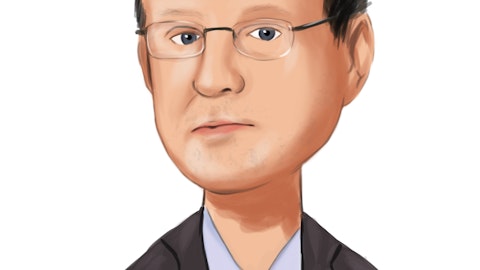Although the masses and most of the financial media blame hedge funds for their exorbitant fee structure and disappointing performance, these investors have proved to have great stock picking abilities over the years (that’s why their assets under management continue to swell). We believe hedge fund sentiment should serve as a crucial tool of an individual investor’s stock selection process, as it may offer great insights of how the brightest minds of the finance industry feel about specific stocks. After all, these people have access to smartest analysts and expensive data/information sources that individual investors can’t match. So should one consider investing in PacWest Bancorp (NASDAQ:PACW)? The smart money sentiment can provide an answer to this question.
PacWest Bancorp (NASDAQ:PACW) has experienced a decrease in hedge fund interest in recent months. PACW was in 20 hedge funds’ portfolios at the end of the second quarter of 2019. There were 21 hedge funds in our database with PACW positions at the end of the previous quarter. Our calculations also showed that PACW isn’t among the 30 most popular stocks among hedge funds (view the video below).

Video: Click the image to watch our video about the top 5 most popular hedge fund stocks.
So, why do we pay attention to hedge fund sentiment before making any investment decisions? Our research has shown that hedge funds’ small-cap stock picks managed to beat the market by double digits annually between 1999 and 2016, but the margin of outperformance has been declining in recent years. Nevertheless, we were still able to identify in advance a select group of hedge fund holdings that outperformed the market by 40 percentage points since May 2014 through May 30, 2019 (see the details here). We were also able to identify in advance a select group of hedge fund holdings that underperformed the market by 10 percentage points annually between 2006 and 2017. Interestingly the margin of underperformance of these stocks has been increasing in recent years. Investors who are long the market and short these stocks would have returned more than 27% annually between 2015 and 2017. We have been tracking and sharing the list of these stocks since February 2017 in our quarterly newsletter. Even if you aren’t comfortable with shorting stocks, you should at least avoid initiating long positions in our short portfolio.

Unlike some fund managers who are betting on Dow reaching 40000 in a year, our long-short investment strategy doesn’t rely on bull markets to deliver double digit returns. We only rely on hedge fund buy/sell signals. We’re going to take a gander at the fresh hedge fund action regarding PacWest Bancorp (NASDAQ:PACW).
Hedge fund activity in PacWest Bancorp (NASDAQ:PACW)
At the end of the second quarter, a total of 20 of the hedge funds tracked by Insider Monkey held long positions in this stock, a change of -5% from one quarter earlier. The graph below displays the number of hedge funds with bullish position in PACW over the last 16 quarters. So, let’s find out which hedge funds were among the top holders of the stock and which hedge funds were making big moves.

More specifically, Cardinal Capital was the largest shareholder of PacWest Bancorp (NASDAQ:PACW), with a stake worth $103.2 million reported as of the end of March. Trailing Cardinal Capital was Fisher Asset Management, which amassed a stake valued at $29.4 million. Basswood Capital, Marshall Wace LLP, and Azora Capital were also very fond of the stock, giving the stock large weights in their portfolios.
Judging by the fact that PacWest Bancorp (NASDAQ:PACW) has experienced bearish sentiment from the entirety of the hedge funds we track, we can see that there is a sect of fund managers who sold off their entire stakes last quarter. Intriguingly, Mike Vranos’s Ellington cut the biggest stake of all the hedgies watched by Insider Monkey, totaling about $1.2 million in stock. Gregg Moskowitz’s fund, Interval Partners, also sold off its stock, about $1 million worth. These transactions are important to note, as aggregate hedge fund interest dropped by 1 funds last quarter.
Let’s check out hedge fund activity in other stocks – not necessarily in the same industry as PacWest Bancorp (NASDAQ:PACW) but similarly valued. We will take a look at Selective Insurance Group, Inc. (NASDAQ:SIGI), Manhattan Associates, Inc. (NASDAQ:MANH), Silicon Laboratories Inc. (NASDAQ:SLAB), and The Wendy’s Company (NASDAQ:WEN). This group of stocks’ market values match PACW’s market value.
| Ticker | No of HFs with positions | Total Value of HF Positions (x1000) | Change in HF Position |
|---|---|---|---|
| SIGI | 14 | 43688 | 2 |
| MANH | 17 | 425498 | -1 |
| SLAB | 18 | 73662 | 6 |
| WEN | 24 | 914976 | -3 |
| Average | 18.25 | 364456 | 1 |
View table here if you experience formatting issues.
As you can see these stocks had an average of 18.25 hedge funds with bullish positions and the average amount invested in these stocks was $364 million. That figure was $224 million in PACW’s case. The Wendy’s Company (NASDAQ:WEN) is the most popular stock in this table. On the other hand Selective Insurance Group, Inc. (NASDAQ:SIGI) is the least popular one with only 14 bullish hedge fund positions. PacWest Bancorp (NASDAQ:PACW) is not the most popular stock in this group but hedge fund interest is still above average. This is a slightly positive signal but we’d rather spend our time researching stocks that hedge funds are piling on. Our calculations showed that top 20 most popular stocks among hedge funds returned 24.4% in 2019 through September 30th and outperformed the S&P 500 ETF (SPY) by 4 percentage points. Unfortunately PACW wasn’t nearly as popular as these 20 stocks and hedge funds that were betting on PACW were disappointed as the stock returned -4.7% during the third quarter and underperformed the market. If you are interested in investing in large cap stocks with huge upside potential, you should check out the top 20 most popular stocks among hedge funds as many of these stocks already outperformed the market so far this year.
Disclosure: None. This article was originally published at Insider Monkey.




